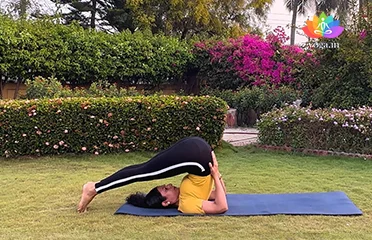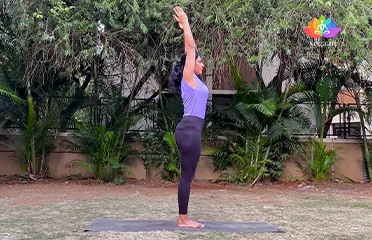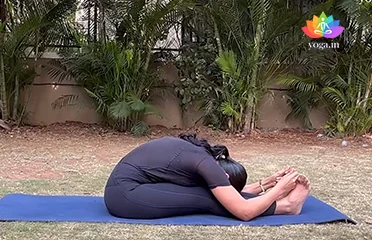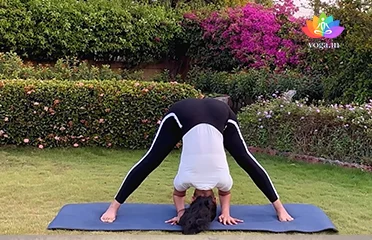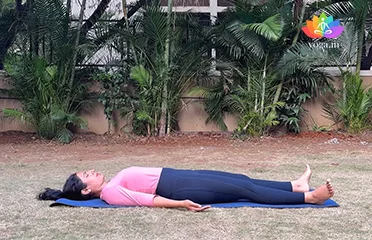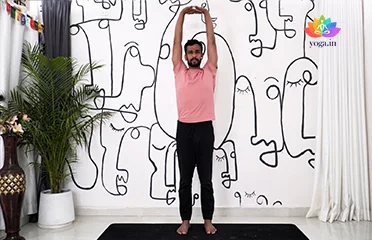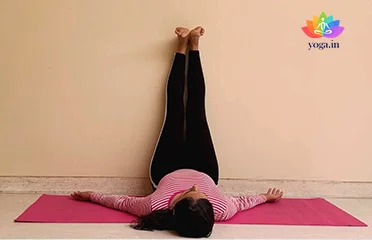Halasana (Plough Pose)
हलासन / Plough Pose
The Sanskrit name is derived from Hala (हला) meaning plough and asana [�K]
Hastapadasana (Hand to Foot Pose)
हस्तपदासन / Hand to Foot Pose
The sanskrit name is derived from hasta (हस्त) means hands, pada (पदा) [�K]
Paschimottanasana (Seated Forward Bend)
पश्चिमोत्तानासन / Seated Forward Bend
The Sanskrit name is derived from three sanskrit words: Paschima (पश्चिमा) [�K]
Prasaritta Padottanasana (Wide-Legged Fo
प्रसारिता पदोत्तनासन / Wide-Legged Forward Bend
The Sanskrit name is derived from Prasārita (प्रसारित) meaning [�K]
Sarvangasana (Shoulderstand)
सर्वाङ्गासनI / Shoulderstand
The Sanskrit name is derived from Sarva (सर्वाङ्ग) meaning all, [�K]
Savasana (Corpse Pose)
शवासना / Corpse Pose
The Sanskrit name is derived from Śhava (शव) meaning "corpse" and āsana [�K]
Setubandhasana (Bridge Pose)
सेतु बन्धासन / Bridge Pose
The Sanskrit name is derived from Setu (सेतु) meaning bridge, Bandha [�K]
Tadasana (Mountain Pose)
ताड़ासन / Mountain Pose
The sanskrit name is derived from tada (ताड़ा) meaning mountain and [�K]
Viparita Karani (Legs Up The Wall Pose)
विपरिता करणी / Legs Up The Wall Pose
The Sanskrit name is derived from Viparita (विपरिता) meaning inverted [�K]
Understanding Sinusitis – Inflammation in Your Sinus Passages
Sinusitis is a common condition causing inflammation in the paranasal sinuses, air-filled cavities near your nose and cheeks. These sinuses normally produce mucus that drains and keeps the passages moist and free of irritants. But when blockages occur, mucus can build up, creating a perfect environment for germs to thrive and trigger an infection.
What Causes Sinusitis?
Several factors can contribute to sinusitis:
- Allergies: Seasonal allergies or sensitivities to dust mites or pet dander can inflame nasal passages, hindering sinus drainage.
- Colds and Viruses: The common cold, flu, and other respiratory infections often lead to inflammation and mucus production, blocking sinuses.
- Nasal Polyps: These soft, benign growths in the nasal passages can obstruct sinus drainage.
- Deviated Septum: A misaligned septum can disrupt airflow and drainage patterns, increasing the risk of sinusitis.
- Environmental Irritants: Smoke, dust, pollution, and other irritants can inflame the nasal passages and sinuses.
- Facial Structure Abnormalities: Underlying structural issues in the face and sinuses can affect drainage.
Recognizing the Signs of Sinusitis:
Be aware of these common symptoms that might indicate sinusitis:
- Facial pain or pressure, usually around the forehead, cheeks, or nose
- Nasal congestion or stuffiness
- Runny or discolored mucus (greenish or yellowish)
- Postnasal drip (mucus dripping down the back of the throat)
- Persistent cough (often worse at night)
- Reduced sense of smell and taste
- Fatigue
- Fever (in some cases)
Treatment Options for Sinusitis:
Conventional Medical Care:
- Over-the-counter medications: Decongestants, pain relievers, and saline nasal sprays can help manage symptoms.
- Prescription medications: Antibiotics address bacterial infections, while corticosteroids reduce inflammation.
- Surgery: In rare cases, surgery may be necessary to remove nasal polyps or correct structural abnormalities.
Complementary and Alternative Approaches (Consult your doctor before using):
- Nasal irrigation: Flushing the nasal passages with saltwater solution can help clear mucus and relieve congestion.
- Steam inhalation: Moist heat can loosen mucus and improve drainage.
- Herbal remedies: Some herbs like ginger and turmeric possess anti-inflammatory properties.
- Acupuncture: Studies suggest acupuncture may offer some relief for sinus symptoms.
Yoga and Pranayama (breathing exercises):
While some studies suggest potential benefits, more research is required to confirm the effectiveness of yoga and pranayama in managing sinusitis. Always prioritize conventional medical treatment and consult your doctor before incorporating these practices.
Dietary Support for Sinusitis:
- Hydration is key: Drink plenty of fluids to thin mucus and aid drainage.
- Fruits and vegetables: They provide essential vitamins, minerals, and antioxidants that support immune function.
- Anti-inflammatory foods: Consider incorporating ginger, turmeric, fatty fish, nuts, and seeds into your diet.
- Limit processed foods and sugary drinks: These can worsen inflammation.
Important Considerations:
- If you experience fever, severe pain, or other acute symptoms, seek immediate medical attention.
- Pregnant women should consult their doctor before engaging in yoga or pranayama practices.
- People with specific medical conditions should discuss the safety of these practices with their healthcare provider.
By understanding the causes and symptoms of sinusitis, one can be more aware of your health and take steps to manage this condition effectively. Remember, prioritize conventional medical treatment and discuss complementary approaches with your doctor to create a holistic plan for optimal relief.


